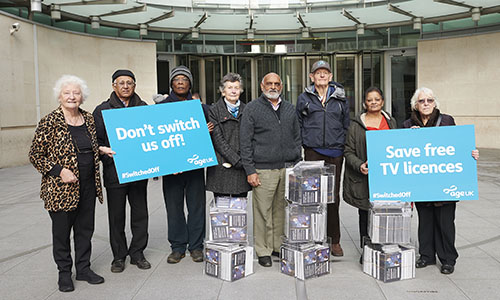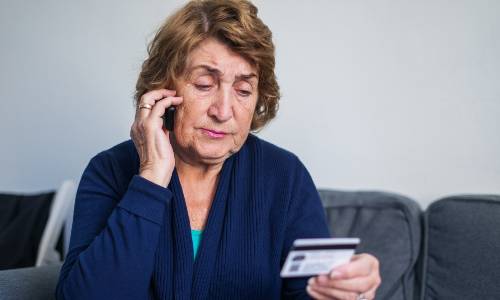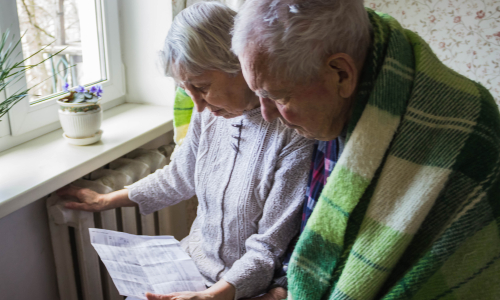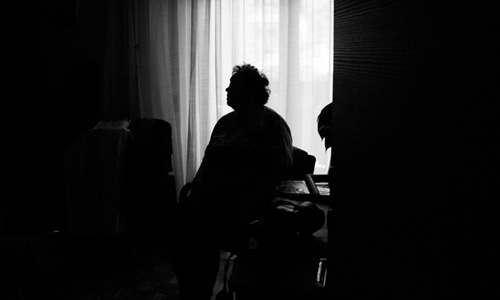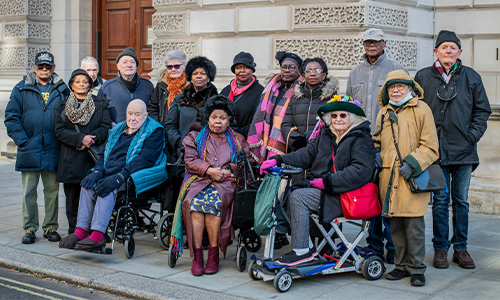Today a group of older people and their representatives will hand in to No 10 Downing Street the #SwitchedOff petition which Age UK has been running for a number of months, in partnership with other age sector organisations including the National Pensioners Convention and Silver Voices.
Age UK's #SwitchedOff petition closed last night with just shy of 635,000 signatures – a gargantuan number, especially when you consider that the people most directly affected by this campaign, the over-75s, are mostly not online. While there was the opportunity to sign the petition offline, it's far harder to reach people in that way. These days it is not unusual to see online petitions organised by Change.org and the like exceeding 100,000 signatures, but to get more than six times that volume of sign-ups would have been unusually impressive, even for them, let alone for a small alliance of charities and organisations that do not have anything like their reach.
The exceptional popularity of the #SwitchedOff petition shows that the proposed removal of TV licences from everyone in this country aged over 75, unless they can prove they are receiving a benefit for those on the lowest incomes called Pension Credit, has struck a real chord with the public.
The polling we have carried out bears this out too; a big majority of people of all ages disapprove of this proposed action by the BBC and the Government, and think TV should remain free for the oldest people in our society. To remove this entitlement after it has been in place for a generation strikes many ordinary people as just plain mean, especially given how much their TV matters to many in this age group.
Hurt and indignation
As well as signing the #SwitchedOff petition, our supporters, many of whom are over-75s, found other ways to express their sense of hurt, indignation and disgust about this proposed policy change. Age UK has been inundated with letters and phone calls, thanking us for campaigning and offering their support.
The National Pensioners Convention, a stalwart partner in the campaign, has organised a number of demonstrations over the last few months, not only in London but in the regions and other nations too, and significant numbers of older people have taken part. It was an honour for me to stand with and alongside older people at two of the London protests – and the way a group of them brought the traffic at Oxford Circus to a halt for ten minutes one Friday lunchtime will stay with me for a very long time!
These experiences were a reminder, if any was needed, that older people are always their own best advocates: our job at Age UK is often more than anything simply to enable and support them to express their views.
Activism at any age
This outpouring of concern, anger and activism from older people, including among the over-75s themselves, shows how much they really do care about this issue, sometimes for themselves, often for others they know too – also that they aren’t going to sit by and let adversity wash over them without doing something about it. Many older people told us that they feel this is ‘the thin end of the wedge’; that if they think they can get away with it, the Government will try to take other benefits away from them too. They aren’t going to acquiesce without a fight.
More broadly, there is a markedly low level of trust, I would say, among many older people in our senior politicians, and little sense that they are really ‘on our side’. And while some media commentators speak and write of our older population as being disproportionately privileged compared to others in our society this is not how it feels to most older people, it is clear.
Shining a spotlight on the over-75s
Something else that has become apparent through this campaign is that, to a degree, extreme old age is another country which a lot of the public, politicians and commentators know very little about. It has been a total revelation to many when we at Age UK have set out the characteristics of the over-75 population and the challenges that many of them face in terms of physical and mental ill health, disability, need for care and loneliness.
Of course, happily a lot of over-75s are hale and hearty and enjoying life to the full on their own terms. But significant numbers are not and the proportion inevitably increases as people reach their 80s and beyond. As a society we are remarkably uncurious about what it is like to be extremely old and finding it hard to keep going – probably because it is too uncomfortable to contemplate.
Yet it is older people like these for whom their TV is particularly important, because they are often largely restricted to home, sometimes to a room or even to their bed, so television really is a precious window on the world and crucial, sometimes only, source of entertainment and companionship.
Streaming services versus 'the box in the corner'
And it is not just that extreme old age is ‘other’, it’s that many older people’s lifestyles are perceived to be too, certainly as regards their use of media and technology. Age UK’s foray into media policy through this campaign has shown us how most of that debate at present is about how mainstream broadcasters can compete with Netflix and the like and continue to attract young viewers, who are much more inclined to watch YouTube and consume video online via mobile devices than through sitting through an entire scheduled programme showing on the ‘box in the corner’ – a certain number of blockbuster series excepting.
There’s a risk therefore that the mass of older people who consume TV in traditional ways are rather taken for granted by broadcasters who are not terribly interested in understanding and meeting their needs – despite the fact that they are their core audience.
Poverty and Pension Credit
It’s a big and growing issue and if we’re not careful it will hurt many older people, as poverty and inequality already do. Many commentators and politicians appear to have been surprised to learn that there remain very substantial numbers of older people living in poverty in this country, about 2 million now.
While this is a marked improvement on the position a generation ago, a long period of progress in reducing pensioner poverty seems to have ended a couple of years ago, and the numbers are now rising again. Economic analysis suggests that the abolition of free TV licences for over-75s, if it goes ahead, will add another 50,000 to the ranks of the officially poor.
In theory, many older people on very low incomes have the opportunity to take them above the poverty line through successfully claiming Pension Credit – the passport to a free TV licence in future according to the BBC’s plan – and yet 2 in 5 of all those older people who are eligible for this important means-tested benefit don’t claim. This has been the position for many years, leaving billions of pounds that ought to be in poor pensioners’ pockets in the Treasury’s coffers.
Government essentially colludes with this failure to claim; they put no public funding into trying to improve take up, as Ministers have rather embarrassingly had to admit in answers to recent Parliamentary questions on the matter.
Publicity about the change to TV licences for over-75s is raising awareness about Pension Credit and encouraging more claims – a very good thing – and it may also increase pressure on the Government to see what more can be done to help our poorest pensioners. Really, ideally, very poor older people would receive the financial help they need automatically without requiring them to jump through any extra hoops.
However, even while this campaign has been underway the Government brought in another policy change which disqualifies some of the poorest pensioners from claiming Pension Credit – the ‘mixed age couple’ reform, under which a couple is only eligible for Pension Credit if both partners have reached State Pension Age. This reverses the previous, well established position and over time will save the Treasury billions, while making life much more difficult for any couple affected, costing them as much as £7,000 a year.
The fight continues
The #SwitchedOff petition may have closed but the campaign is far from over. We have learned a lot so far and I hope we can use it to make the next phase of our campaign even more effective in the weeks and months ahead. Millions of older people are counting on us and we won’t let them down.
 How you can help
How you can help
Ask your MP to save free TV for older people by using our simple online form. Or tell the Prime Minister to save free TV licences with a quick tweet.


